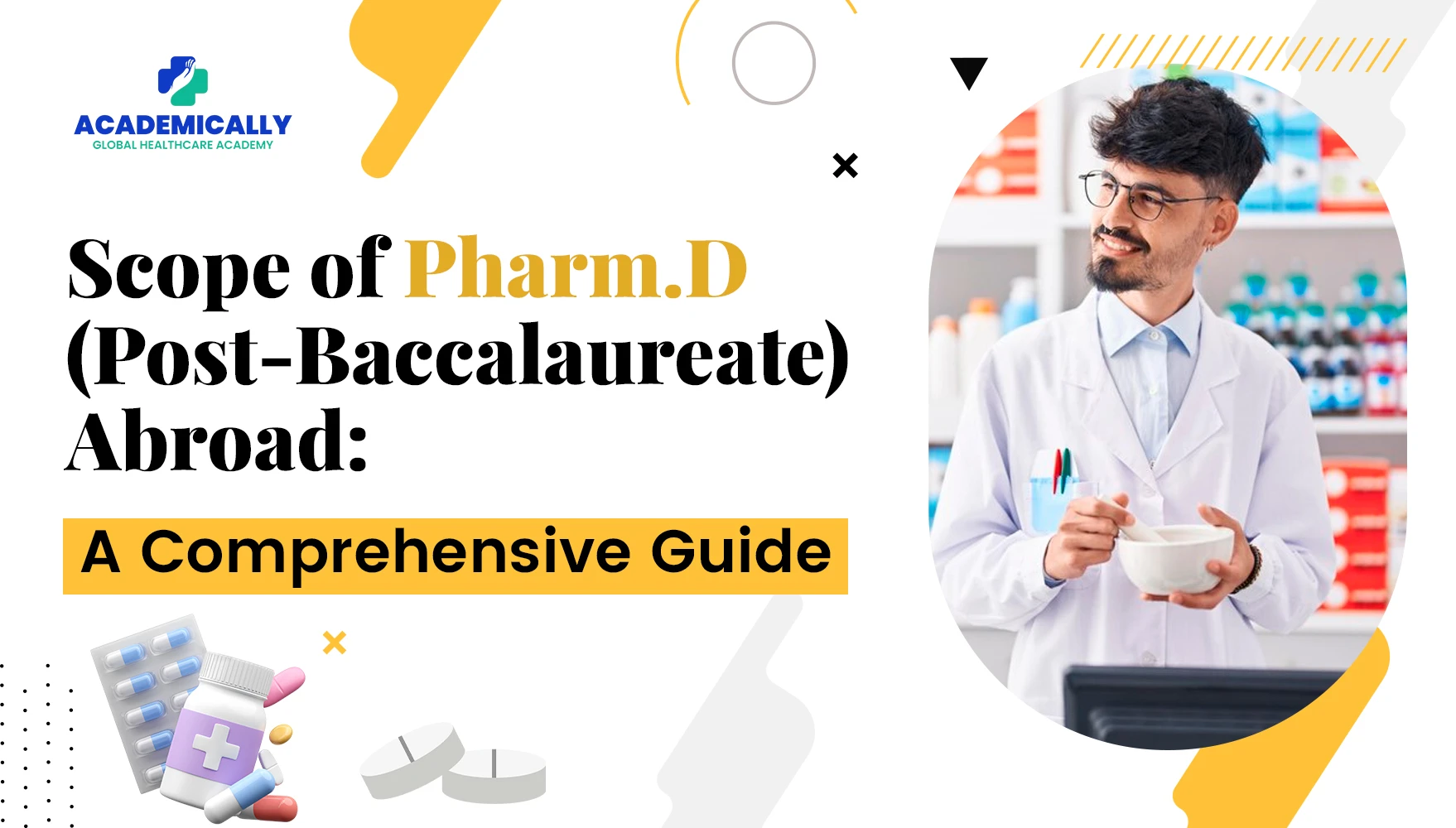What is Pharm.D (Post-Baccalaureate)?
Pharm.D (Post-Baccalaureate) is a specialised program for those with a Bachelor’s degree in Pharmacy who wish to pursue advanced training in clinical pharmacy. The program typically lasts three years and is designed to bridge the gap between basic pharmacy education and the complex pharmaceutical roles that exist globally. Graduates from this program are equipped with the clinical knowledge, research skills, and practical experience required to excel in a variety of healthcare settings abroad.
Why Pursue Pharm.D (PB) Abroad?
Pursuing a Pharm.D (PB) degree creates possibilities for practising in different systems and also provides exposure to international best practices. Because healthcare processes today are patient-centred and more interprofessional in various countries such as the United States, Canada, Australia, the United Kingdom, and Europe, there is more significance for the clinical pharmacist. This advanced degree makes you eligible for more specialised roles that demand an understanding of both pharmacotherapy and patient care.
Let’s explore the career scope and opportunities available for Pharm.D (PB) graduates internationally.
1. Clinical Pharmacist Roles
One of the most sought-after positions for Pharm.D graduates abroad is that of a clinical pharmacist. In this role, pharmacists work closely with physicians, nurses, and other healthcare providers to ensure the safe and effective use of medications. Clinical pharmacists are responsible for monitoring drug therapy, managing medication side effects, and providing patient education.
Countries such as the U.S., Canada, Australia, and the UK have integrated clinical pharmacy practices into their healthcare systems. There is a continuous demand for skilled pharmacists in specialised fields like oncology, geriatrics, and cardiology, which greatly influences patient outcomes.
2. Research and Development (R&D)
Pharm.D (PB) graduates with a passion for innovation can find rewarding careers in the pharmaceutical industry, especially in research and development (R&D). Major pharmaceutical hubs in Germany, Switzerland, the U.S., and Japan are home to cutting-edge research centres where pharmacists contribute to the discovery and development of new drugs. These roles often involve working on clinical trials, developing new formulations, and studying drug efficacy. The Pharmacy Practice Research Methods and Impactful Publishing Course by Academically is designed to provide you with the tools and knowledge needed to conduct robust and impactful research and get published in high-impact journals.
Pharmacovigilance is another key area where pharmacists can contribute. Ensuring drug safety and monitoring adverse reactions, especially during clinical trials, requires a deep understanding of pharmacotherapy and patient care.
3. Academia and Teaching Roles
Numerous Pharm.D (PB) program alumni choose to build an academic career by training future pharmacists. They can also get involved in some investigations. University Academia is accessible in every country, particularly Canada, the United Kingdom, Australia, and the United States.
It is a rewarding experience to teach pharmacy students, conduct workshops, as well as take part in clinical research. Moreover, these posts usually allow carrying out research and writing papers, which contributes to one’s international standing.
4. Regulatory Affairs and Pharmacovigilance
The regulations in drug development, production, and approval are very strict in countries like USA, Australia or Japan. Hence there is a growing need for experts in regulatory affairs. Pharm.D graduates can work in government or private sectors, ensuring that pharmaceutical products meet international safety standards. The pharmaceutical industry in these countries is heavily regulated.
Pharmacovigilance roles also fall under this category, where pharmacists monitor and report adverse drug reactions. This field ensures patient safety and provides feedback for pharmaceutical companies and healthcare providers.
5. Community Pharmacy
In countries like Canada, New Zealand, Australia, and the UK, community pharmacists are often the first point of contact for patients seeking healthcare advice. Pharm.D (PB) graduates can work in community settings, providing medication therapy management, health consultations, and chronic disease management.
These roles require pharmacists to manage patient relationships, offer personalised care, and promote public health initiatives, such as vaccinations and health screenings.
6. Public Health and Policy
Pharm.D (PB) graduates who are eager to make an impact on the public health front can consider working in healthcare policy, health promotion and disease prevention. Assignment to global agencies such as the World Health Organization (WHO) and to different non-governmental organizations (NGO) gives an opportunity for pharmacists to participate in projects improving healthcare access to poor populations.
Public health positions overseas include but are not limited to overseeing drug supply operations, developing medical programs, as well as making sure that the necessary medications get to the people who require them. Such positions are more common in developing countries and global health programs.
7. Licensing and Migration Opportunities
While the scope of Pharm.D (PB) abroad is vast, obtaining the necessary licensing is a crucial step for those planning to work internationally. Different countries have distinct processes and exams:
- United States: Pharm.D graduates must pass the Foreign Pharmacy Graduate Equivalency Examination (FPGEE), the North American Pharmacist Licensure Examination (NAPLEX), and complete an internship to become a licensed pharmacist.
- Canada: Pharmacists must pass the Pharmacy Examining Board of Canada (PEBC) exams to practice.
- Australia and New Zealand: The Australian Pharmacy Council (APC) administers the OPRA exam and manages the registration process and internships.
- UK: Pharmacists need to register with the General Pharaceutical Council (GPhC)after passing the required exams and completing an internship.
Navigating the migration process involves understanding each country’s regulatory requirements, obtaining visas, and securing employment opportunities.
8. Further Education and Specialization
Pharm.D (PB) graduates can also engage in specific disciplines further through postgraduate programmes, residencies or fellowships. Disciplines such as clinical pharmacy, hospital pharmacy, health care administration, and industrial pharmacy enable practitioners in the area to become more specialised.
For instance, in the US or Canada, residencies train graduates in clinical care and enable them to work in different healthcare settings to develop skills required for advanced clinical practice. Also, training in fellowships helps one have research as well as leadership practice.
Final thoughts
Pursuing a Pharm.D (Post-Baccalaureate) degree offers a transformative opportunity to enhance your career and make a significant impact in global healthcare. With the demand for skilled pharmacists growing across various countries, this advanced education equips you with the clinical expertise and practical experience needed to excel in diverse roles—from clinical practice to research, academia, and public health.
At Academically, we provide a wealth of resources to support your journey. Our comprehensive courses, live lectures, and expert guidance ensure you gain the knowledge and skills necessary to thrive in your career.
Are you ready to take the next step? Book your free counselling session today and explore how a Pharm.D (PB) can open doors to exciting opportunities around the world!





